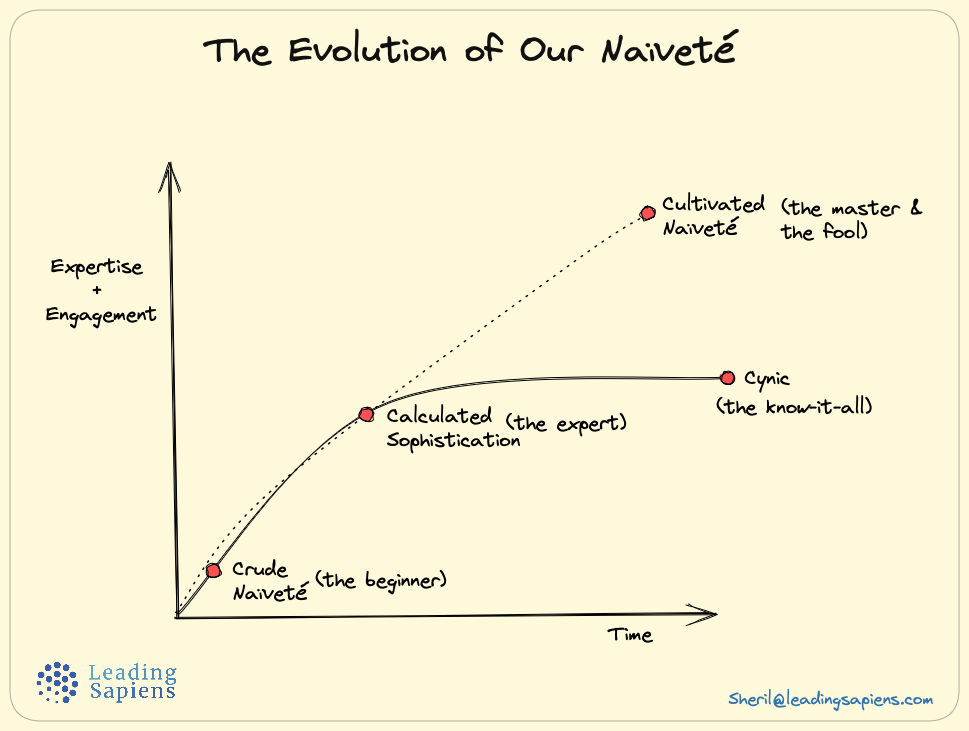Foolishness of Intelligent Bees vs Genius of Dumb Flies | LSW#51
When intelligence becomes a liability & being dumb an asset
Hey! It’s Sheril from Leading Sapiens. Welcome to my newsletter, where I share strategies for getting savvier at the game of work.
Previous editions ICYMI:
Bees vs Flies
If you place in a bottle half a dozen bees and the same number of flies, and lay the bottle down horizontally, with its base to the window, you will find that the bees will persist, till they die of exhaustion or hunger, in their endeavor to discover an issue through the glass; while the flies, in less than two minutes, will all have sallied forth through the neck on the opposite side. ...
It is their (the bees') love of light, it is their very intelligence, that is their undoing in this experiment. They evidently imagine that the issue from every prison must be there where the light shines clearest; and they act in accordance, and persist in too logical action. To them glass is a supernatural mystery they never have met in nature; they have had no experience of this suddenly impenetrable atmosphere; and the greater their intelligence, the more inadmissible, more incomprehensible, will the strange obstacle appear.
Whereas the feather-brained flies, careless of logic as of the enigma of crystal, disregarding the call of the light, flutter wildly hither and thither, and meeting here the good fortune that often waits on the simple, who find salvation there where the wiser will perish, necessarily end by discovering the friendly opening that restores their liberty to them.
— Maurice Maeterlinck in The Life of the Bee cited by Karl Weick
I’m not sure how accurate or repeatable this experiment is, but I have seen this pattern often enough both in myself and others to attest that this is equally applicable to us humans.
The so called intelligent “bee” types overthink and restrict themselves while the not-so-smart “fly” types keep trying different things until something works.
Some patterns to consider
✴️ Security of the crowd
The more similar your actions are to the rest of the crowd, the more similar your results. A very different approach, while seemingly risky, can also lead to dramatically different results. We obsess about the potential downside without giving enough consideration to the upside.
✴️ Success restricts
Previous successes and current skills make us think in a restricted way, which blinds us to other options. New efforts and different outcomes require learning new terministic screens; aka a new language and vocabulary in a domain.
✴️ Knowhow vs “do-how”
A common mistake is to think that all actions require considered reasoning. We put an onus on pre-knowing. The logic goes something like “to do something, I need to know how first”. But you often have to do something BEFORE you can know how to. The knowing happens through the doing. This is why real learning is painful, and why we resist it.
✴️ Leaning in vs leaning out
When dealing with large amounts of change and uncertainty, the tendency is to double-down upon what we already know. While this might be reassuring, it’s not always optimal. Random experiments while seemingly suboptimal can be the most efficient. This is also how we keep pushing the envelope of our skills and capabilities.
✴️ The value of crises
Seeming headaches and inconveniences are also opportunities for growth and learning new skills. This is not about “positive thinking” but instead understanding the very nature of how growth happens. While crises don’t make for fun times, they also build a new set of skills, bring a team together, and give you something to talk about.
✴️ Staying naive
The curse of expertise is that the more you know how to make something work, the more you also know how something will NOT in fact work. This is how experts over time turn into cynics and why maintaining your naiveté is key to long-term success.
✴️ Persistence vs flexibility
Persistence is a virtue, but so is being flexible and knowing when to change tactics. Emerson put it more bluntly:
A foolish consistency is the hobgoblin of little minds, adored by little statesmen and philosophers and divines.
✴️ Experimenting to adapt
Adaptation by definition means we do not know what’s going to work beforehand. This means being smart about running as many experiments as we can. It’s the difference between small bets vs betting the farm.
Questions for reflection
How’s your expertise blinding you to different options?
Are you trying enough dumb things?
What stage is your project at? Does it require convergent (bees) thinking, or could you use more of a divergent (flies) approach?
Do your systems allow for any “foolish” or random behavior?
Is there enough variety in your approaches to allow for serendipitous success? Or are you trying to script it to the tee?
How is past success restricting today’s possibilities?
Are you optimizing for cleverness or effectiveness? The two are not always correlated.
Related reading
Below are some additional pieces that explore different aspects:
Tetris is a more apt metaphor than chess for how we approach strategy in daily life.
That does it for this edition. If you found this valuable, please like and share. It makes my day, and helps other folks to find this publication. See you next week!





